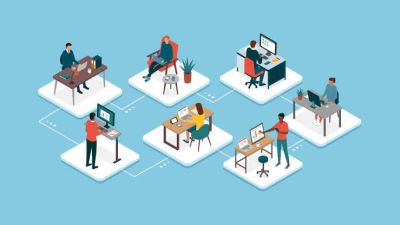Is work...a place? Founders are divided on whether to return to their old way of doing business.
Founders and executives around the globe have taken lessons learned over the past year to inform their view of what their workplace will look like in the future. At this week's Collision conference, the future of the workplace was top-of-mind--though founders had a wide diversity of expectations about how their companies will work coming out of the pandemic. Here are a few of the most fascinating.
More satisfied, talented, global workforces.
Phil Libin, the founder of Evernote, All Turtles, and upstart video-presentation platform Mmhmm, says having gone all-virtual has given his company superpowers--and he's not willing to give those up by returning to a physical office. He has vowed with his most recent two companies that his teams will never return to offices post-pandemic. The first superpower he cited was the ability to hire talent not just locally--but anywhere in the world. "All of our job listings say 'global,'" he said Wednesday. "I'm never putting the 'in' back in place."
Second superpower: Not commuting. "Why would I ever give up the superpower of giving every person on my team two extra hours a day?" And third: Helping employees avoid the extreme expense of housing in major cities. "Why could every person on my team not live in a nice house with a nice school district, if that's what they want?" he says.
Remote work requires different processes than office work.
Jason Fried, the founder of Basecamp and author of "Remote: Office Not Required," is firmly anti-Zoom and pro-asynchronous work at his all-remote company, which makes tools for employee communication. Now that much of the rest of the office-worker world has experienced remote work over the past year, he's hoping other companies embrace a bigger idea: that the nature and strengths of remote work are very different than in-person work.
For employees on dedicated projects, requiring focus or creative critical thinking, working remotely can be far more productive than working in an office, he says. But a lot of companies are doing it wrong--allowing the digital distractions of constant Slack notices and interruptions of Zoom meetings to disrupt the workflow afforded by solitary work at home. He advises helping employees manage their own time and get the most out of long stretches of solo work by keeping important decisions out of real-time chat. "The expectation of immediate response is really toxic," he says. "What's healthy is giving people long stretches of time to do their work without... the pressure to pay attention to a dozen real time decisions at once."
Teams have the opportunity to work smarter and more empathically.
Jonathan Notaro, the founder and chief creative officer at Brand New School, a branding agency the works in production, said this year of all-remote work has made harnessing his teams' creativity more challenging. "So much of our work happens through discourse," he said at Collision Thursday. "Those pieces of magic are so much harder to harvest in this environment."
But he's seen bright spots--and moments that made his company stronger. Having Zoom windows into colleagues' and employees' homes has given him insight into their personal priorities and passions, and brought his team closer. "You start to think more about their personal lives, because it's right there. I think that's been a real gem from this whole experience. It's made us all closer." Brand New School has had to think harder about scheduling, and is more disciplined about meetings after a year of remote working. Notaro said: "I feel like we've become more focused."
Office work and gathering will be a lot more exciting.
The founder and CEO of Eventbrite, Julia Hartz, saw her company's revenue drop to zero as the pandemic hit in March of 2020. After two rounds of financing and a company restructuring in the first 90 days of work-from-home, her company saw a boom in digital events. Now, as restrictions on gatherings lift around the globe, she's expecting the physical event ecosystem to flourish as well. "We are heading into a roaring 20s! Never underestimate the power of humans who feel they deserve something," she said.
As for the return to work, Hartz doesn't expect all her employees immediately to start daily commuting, but says since Eventbrite was founded on the premise of gathering in person, the company will continue to operate office "hubs" around the world where employees can work and meet. "If we do it right people will look forward to coming to the office, to see each other and to collaborate," she said.
Inc
